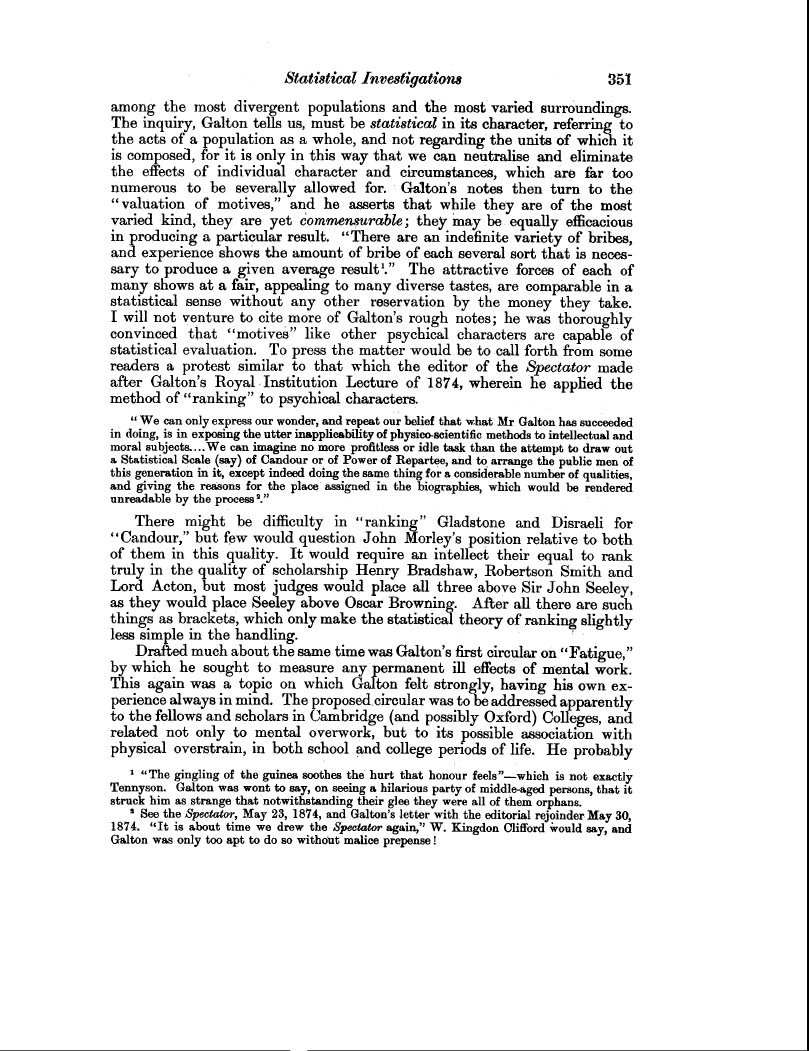Statistical Investigations 351
among the most divergent populations and the most varied surroundings. The inquiry, Galton tells us, must be statistical in its character, referring to the acts of a population as a whole, and not regarding the units of which it is composed, for it is only in this way that we can neutralise and eliminate the effects of individual character and circumstances, which are far too numerous to be severally allowed for. Galton's notes then turn to the " valuation of motives," and he asserts that while they are of the most varied kind, they are yet commensurable; they may be equally efficacious in producing a particular result. "There are an indefinite variety of bribes, and experience shows the amount of bribe of each several sort that is necessary to produce a given average result'." The attractive forces of each of many shows at a fair, appealing to many diverse tastes, are comparable in a statistical sense without any other reservation by the money they take. I will not venture to cite more of Galton's rough notes; he was thoroughly convinced that "motives" like other psychical characters are capable of statistical evaluation. To press the matter would be to call forth from some readers a protest similar to that which the editor of the Spectator made after Galton's Royal, Institution Lecture of 1874, wherein he applied the method of "ranking" to psychical characters.
°' We can only express our wonder, and repeat our belief that what Mr Galton has succeeded in doing, is in exposing the utter inapplicability of pbysico-scientific methods to intellectual and moral subjects... .We can imagine no more profitless or idle task than the attempt to draw out
a Statistical Scale (say) of Candour or of Power of Repartee, and to arrange the public men of this generation in it, except indeed doing the same thing for a considerable number of qualities, and giving the reasons for the place assigned in the biographies, which would be rendered
unreadable by the process'."
There might be difficulty in "rankin ' Gladstone and Disraeli for "Candour " but few would question John orley's position relative to both of them in this quality. It would require an intellect their equal to rank truly in the quality of scholarship Henry Bradshaw, Robertson Smith and Lord Acton, but most judges would place all three above Sir John Seeley, as they would place Seeley above Oscar Browning. After all there are such things as brackets, which only make the statistical theory of ranking slightly less simple in the handling.
Drafted much about the same time was Galton's first circular on "Fatigue," by which he sought to measure any permanent ill effects of mental work. This again was a topic on which Galton felt strongly, having his own experience always in mind. The proposed. circular was to be addressed apparently to the fellows and scholars in Cambridge (and possibly Oxford) Colleges, and related not only to mental overwork, but to its possible association with physical overstrain, in both school and college periods of life. He probably
' "The gingling of the guinea soothes the hurt that honour feels"-which is not exactly Tennyson. Galton was wont to say, on seeing a hilarious party of middle-aged persons, that it struck him as strange that notwithstanding their glee they were all of them orphans.
2 See the Spectator, May 23, 1874, and Galton's letter with the editorial rejoinder May 30, 1874. "It is about time we drew the Spectator again," W. Kingdon Clifford would say, and Galton was only too apt to do so without malice prepense !

